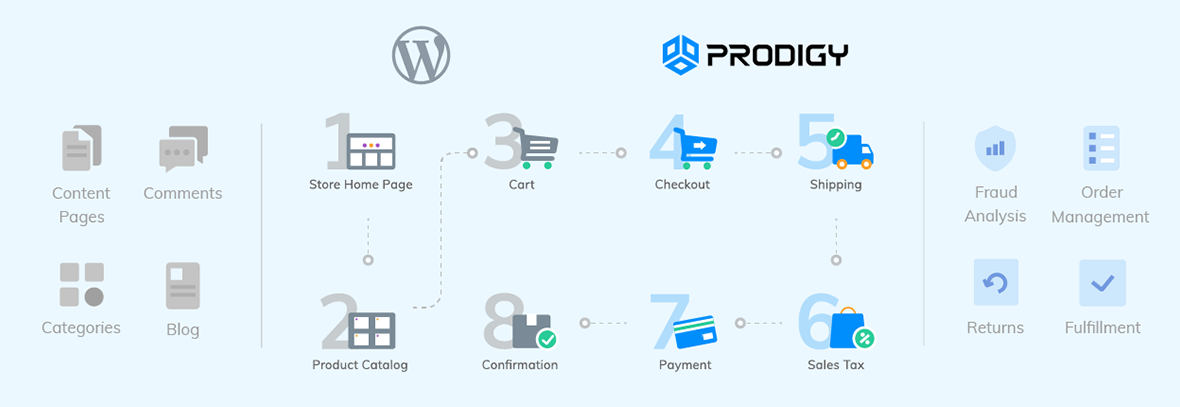After three years of development from a team of 10 – including rigorous beta testing – Prodigy Commerce is proud to announce an intriguing new hybrid eCommerce platform.

The ultimate goal with Prodigy is to make the WordPress community more efficient and excited about building websites for store owner clients—with the intention of easing pain points that come from self-hosted solutions like WooCommerce and hosted platforms like Shopify.
- What is Prodigy Commerce?
- A Quick Roundup of Prodigy Commerce
- What Does it Cost to Use Prodigy Commerce?
- In Fact, Prodigy Incentivizes Users to Learn and Adopt the Platform
- That’s Wonderful… But How Does Prodigy Commerce Make Money?
- Maintain Full Control of Your eCommerce Website
- How Prodigy Was Built
- Hand-selected Integration Partners
This article is part of a three-piece series. To learn more about the Prodigy Commerce platform, read the next segment: Prodigy Commerce vs WooCommerce: How Do They Compare?
What is Prodigy Commerce?
As mentioned, Prodigy Commerce comes from the hard work of a dedicated team of engineers. The folks at Prodigy have deep affections for WordPress, but they see failures in its eCommerce infrastructure, namely that a plugin runs the entire store operation and typically requires you to install and pay for a myriad of other add-ons and extensions to build a fully functional online store.
WooCommerce, in general, is designed for developers/designers/agencies to construct sites for store owners. Shopify, on the other hand, provides far more intuitive eCommerce tools neatly packaged for do-it-yourself store owners.
Prodigy offers the best of both worlds.
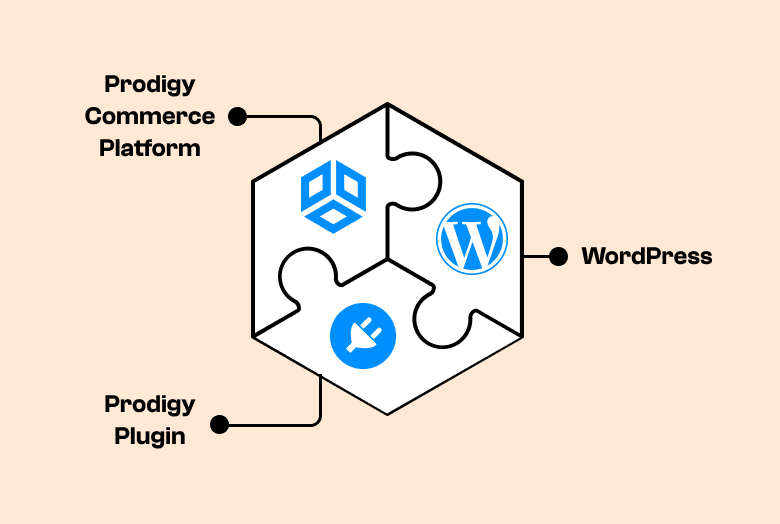
Prodigy is specifically designed to be implemented by web developers and agencies, for building beautiful online stores without the unnecessary add-ons and security issues you get with WooCommerce.
Therefore, Prodigy functions as a hybrid eCommerce platform, bringing together the benefits of the superior WordPress content management system and a full, separate eCommerce platform, akin to Shopify. These two elements are merged using a simple integration plugin.
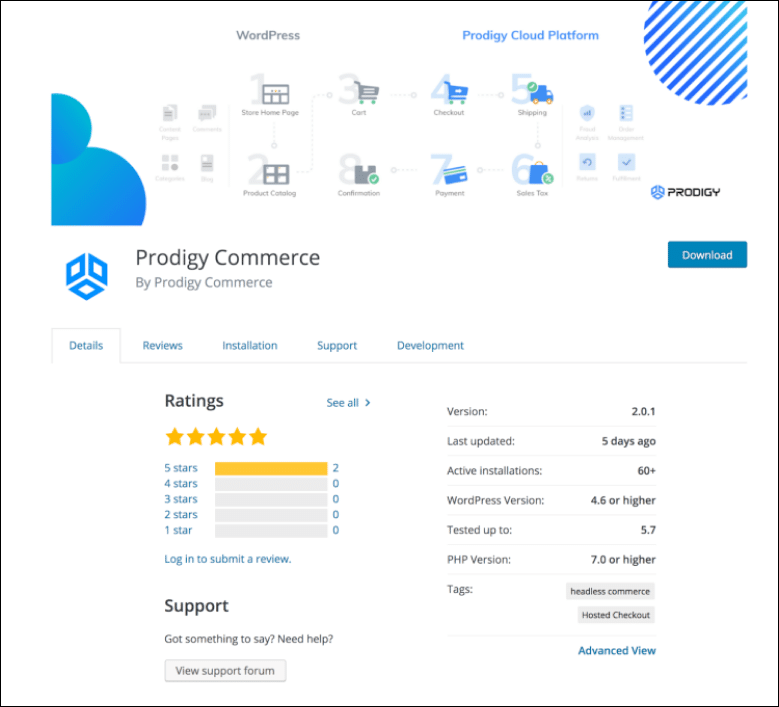
There’s no relying on a plugin to run your entire product management operation like with WooCommerce, yet you still receive the beauty of WordPress page building, blog posting, and content distribution, all of which are severely lacking in Shopify.
A Quick Roundup of Prodigy Commerce
- An elegant alternative to WooCommerce for the WordPress community.
- A hybrid solution that combines the advantages of WordPress content management and design with an eCommerce platform similar to Shopify—without the high Shopify fees.
- Free, with no limits, add-ons, up-sells, subscriptions, or transaction fees. The only cost is for lightweight WordPress hosting and a theme.
- Core features include subscriptions, conversion-optimized checkouts, automated tax calculations, shipping, payment processing, fraud prevention, abandoned cart recovery, and more.
- Developers, designers, and agencies receive incentives to implement and utilize Prodigy.
- The core functionality and integrations are pre-selected and built into the platform, with options to use what you need. So there’s no requirement for extensions.
- WordPress and PHP skills are required.
- Built primarily for those in the WordPress community who make sites for store owners.
The power and uniqueness of Prodigy Commerce have been necessary for quite some time. Far too often developers talk about how they adore the CMS functionality of WordPress for blogging and designing a storefront. That’s why Prodigy only uses WordPress for those advantages.
In addition, it’s clear that Shopify and BigCommerce store owners enjoy how easy it is to launch and run an online store, yet most of these subscription eCommerce platforms falter when it comes to content creation and site-building.
Therefore, everything eCommerce lives on the Prodigy Commerce Dashboard, as a full eCommerce platform.
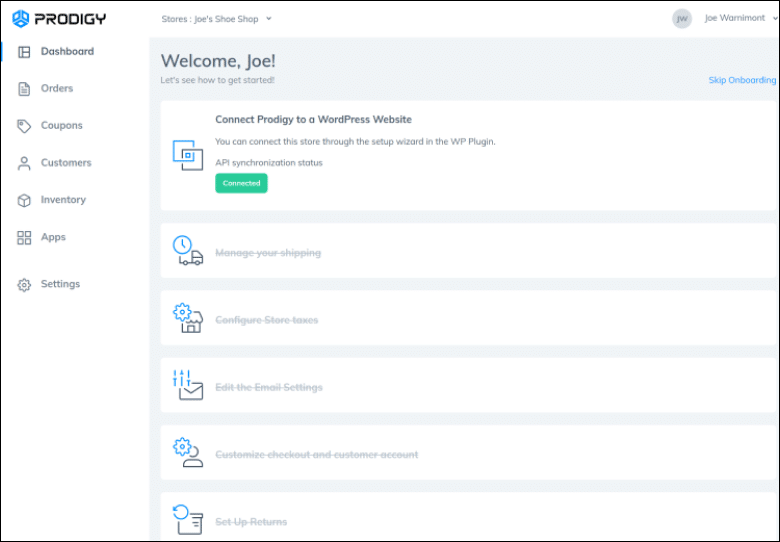
The developers at Prodigy didn’t want to mess with the WordPress CMS, so they connected their powerful eCommerce platform to WordPress with a plugin, nothing more or less. It makes sense since a plugin for eCommerce should be just that, a connection to a better online store system—whereas WooCommerce tries to make it work but has too many downfalls.
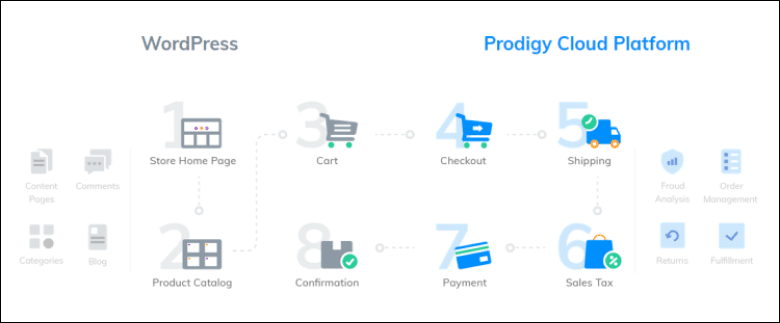
Prodigy’s team of 10 dedicated developers has pulled together a fantastic revelation in the WordPress eCommerce world. The Prodigy eCommerce platform looks to be a serious engineering exercise to convert developers and store owners alike, making for the hybrid system that the eCommerce market needs.
What Does it Cost to Use Prodigy Commerce?
The Prodigy eCommerce platform has no fees, up-sells, add-ons, or subscriptions.
This goes for both developers and store owners.
Prodigy eliminates transaction fees as well, besides the standard credit card processing fees you would expect when using any platform like WooCommerce, Shopify, or BigCommerce.
The team at Prodigy negotiates these transaction fees with payment processors. Therefore, you can expect to begin with the normal 2.9% + $0.30 per transaction. All processing companies have their own rates, but the major brands like Stripe and Square stick to the usual 2.9% + $0.30 transaction fee.
As a benefit, Prodigy rewards high-volume vendors with decreased transaction fees, and can match the rates of any other processor, making it fruitful for those companies that grow regularly.
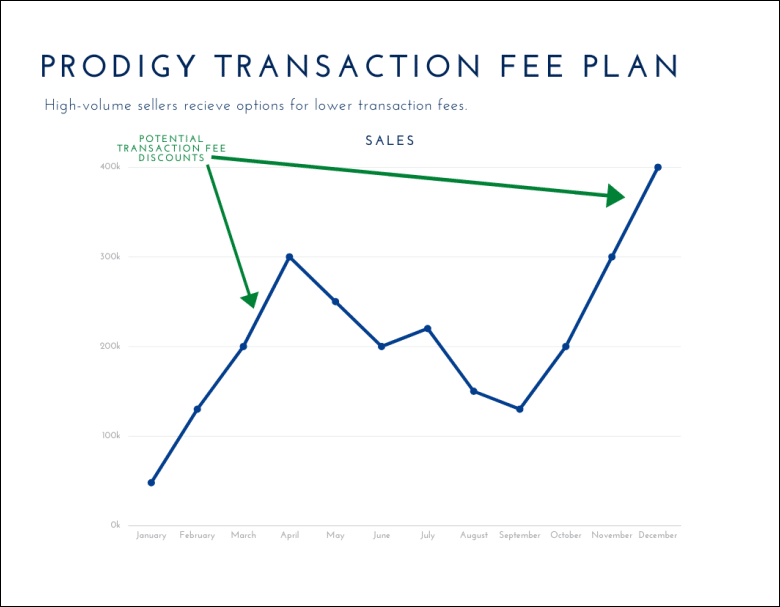
Here’s a general pricing comparison to give you an idea of expenses when using Prodigy vs WooCommerce and Shopify.
| Cost Category | |||
|---|---|---|---|
| Monthly Subscription | $0 | $0 | $29, $79, or $299. |
| Hosting |
$0 for Prodigy – hosted on Amazon Web Services (AWS). WordPress is self-hosted. Not free, but minimal since the product catalog is maintained on Prodigy and checkout and order management are handled on Prodigy
|
Self-hosted. From around $3 to $100 per month. | $0, included with subscription. |
| Transaction Rate and Fee | 2.9% + $0.30 (lower for high-volume stores). Ensured of a direct relationship with an actual payment processor. |
2.9% + $0.30 (could include monthly and/or international fees depending on the processor chosen). WooCommerce Payments is simply a white-labeled version of Stripe
|
2.9% + $0.30 (+2.0%, 1.0%, or 0.5% if Shopify Payments is not used. Lower base rate and fee for high-volume stores). Shopify Payments is simply a white-labeled version of Stripe
|
| Domain | Starting around $10 per year. | Starting around $10 per year. | Starting around $10 per year. |
| Theme | $0 to $250 one-time payment for a WordPress theme. | $0 to $250 one-time payment for a WordPress theme. | $0 to $320 one-time payment for a Shopify theme. |
| Add-ons | $0. | $500 to $2,500 per year for plugins, extensions, and third-party services. | $500 to $5,000 per year for apps and third-party services. |
In Fact, Prodigy Incentivizes Users to Learn and Adopt the Platform
For those who currently work with another eCommerce platform, you know that it’s near impossible to find a free solution that allows you to reasonably scale. WooCommerce has pricey add-ons, while Shopify ups the monthly fee as a store grows.
Prodigy is completely free, besides the fees from payment processing companies and a low-priced WordPress host.
In addition, the Prodigy Partner Program provides the following benefits to developers and agencies that use the platform and/or migrate stores from other platforms to Prodigy:
- Influence over the development roadmap
- Sharing of client pain points
- Financial incentives

That’s Wonderful… But How Does Prodigy Commerce Make Money?
When something sounds too good to be true, people tend to err on the side of caution. In the technology world, free products and services often mean that the user is in fact the product, like how free social networks or search engines collect and sell user data.
After speaking with the Prodigy team, they made it clear how they make money—and it’s not from developers, store owners, or any Prodigy users for that matter—or by selling user data.
As an alternative to charging monthly and transaction fees like Shopify, or selling extensions to make the platform fully functional, like WooCommerce, Prodigy earns its revenue from relationships with the payment processors.
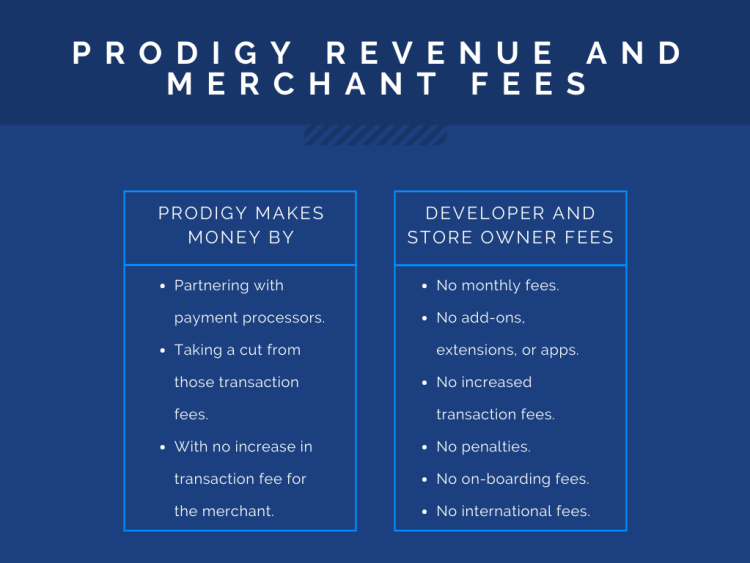
Just like WooCommerce, Shopify, BigCommerce, and the other major platforms, the Prodigy store owner pays the standard 2.9% + $0.30 per transaction. Prodigy doesn’t pass increased rates to merchants; they’ve developed relationships with the payment processors to take a cut of the usual transaction fee.
With these partnerships, business owners and WordPress developers and agencies don’t have to worry about upfront or ongoing subscription or transaction fees. As a bonus for growing brands, the Prodigy team can negotiate lower transaction fees and can match the rates of any other processor.
In short, Prodigy developers and store owners never have to pay for:
- Add-ons, apps, extensions, or plugins.
- Monthly fees.
- Inflated transaction fees.
- International transaction fees.
- On-boarding fees.
- Penalties.
The relationships formed earn Prodigy a small residual from each transaction processed, pulling from the processor’s cut of the transaction fee. The rates paid by store owners remain the same as if they were to sign up for a Stripe or PayPal account and configure a Pay Now button or integrate that payment processor into their current WordPress store.
As such, the 2.9% + $0.30 transaction fee you would typically be charged for every sale doesn’t get inflated with an extra one or two percent to accumulate more revenue for Prodigy.
In speaking with Prodigy management, they state that they’re so confident in Prodigy’s pioneering feature-set and infrastructure—and their track record in partnering with the top payment processors—that they plan to not only be around for a long time but thrive in a climate that’s clamoring for better solutions that are also less expensive.
Prodigy Empowers Developers, Designers, and Agencies
Overall, companies like Shopify spend a significant amount of marketing dollars on affiliate payouts. This means bloggers and online marketers vouch for Shopify’s DIY system while regular WordPress developers get pushed to the side.
Prodigy, on the other hand, skips the affiliate marketing spending. Instead, Prodigy incentivizes the developers who are actually doing the hard work.
Maintain Full Control of Your eCommerce Website
Another highlight of the Prodigy Commerce platform involves how you’re able to control and customize elements of client stores.
The Prodigy team’s expertise is in the development of a ground-breaking eCommerce platform based on feedback, critiques, and pain points gathered from WooCommerce and Shopify developers. Because of this focus, the Prodigy team believes that the eCommerce store owners, agencies, designers, developers, and other stakeholders should be free to exercise their areas of expertise, without Prodigy hindering them in any way.
Prodigy refrains from completing website development work, both frontend and backend, for store owners. Prodigy provides the tools, affordable pricing, and necessary support for developers to create something special for their store owner clients.
According to Prodigy management, they only interact with store owners when those owners need help setting up their merchant accounts. The same can be said for when merchants have questions about the platform or running their day-to-day operations with the system. In addition, Prodigy is able to resolve issues for designers and answer questions that may get passed along from their own clients.
If a store owner inquires the Prodigy team about website development work, it’s explained that Prodigy serves the role of the platform provider and directs the store owner back to the developer who manages the website.
Overall, Prodigy isn’t a potential competitor. It functions as part of your toolbox of resources in case something goes wrong or you can’t resolve a problem for a client.
How Prodigy Was Built
Over the course of three years, Prodigy engineers built a vision with the use of React – the open-source JavaScript library, WordPress – everyone’s favorite content management system, and Ruby on Rails – a popular framework, or collection of tools, based on the Ruby coding language.

With these building blocks, the Prodigy team structured a platform that provides the versatility needed for developers and agencies to customize online stores as much as possible. In addition, Prodigy fulfilled the need for a recognizable infrastructure that only requires a small learning curve in situations where explanation to beginners is necessary.
Hand-selected Integration Partners
Yes, Ruby on Rails and React provided the building framework, and WordPress allows for immediate adoption and simple content creation. But Prodigy expands past those preliminary elements to ensure that all aspects of eCommerce get covered for both small and large online stores.
In doing so, Prodigy partners and integrates with several eCommerce apps and software options, from tax management tools to shipping systems and tracking essentials to security apps. These are all configured into Prodigy, creating one seamless unit, not a collection of add-ons.

The list of built-in integrations includes:
- ShipEngine for all shipping essentials, like calculations for multiple regions and countries.
- TaxJar for sales tax calculations, automated customer charging, and a fully integrated, one-click solution to activate this feature.
- Google Analytics for connecting to your online store and learning about specific insights like custom behavior.
- Facebook Pixel for linking stores to Facebook accounts and obtaining data from Facebook marketing and ad-placement efforts that lead to the store.
- Abandoned cart recovery to automate messaging to customers who leave their carts filled with potential sales.
- Fraud analysis, with MaxMind minFraud, to block customers with ill-intentions and identify fraudulent activity before it costs store owners.
- Fully integrated payments that get activated with a quick setup and place payments into a merchant account as sales compile.
- Subscription management, with built-in features to add recurring payments on for any product page.
- Elementor support for using the popular drag-and-drop page builder to design an online store. The integration includes a variety of Prodigy widgets and page templates for customizing every aspect of your store.
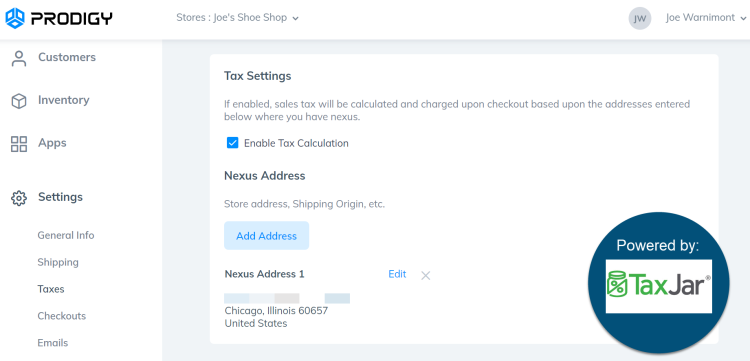
Give Prodigy Commerce a Try Today
If you’re a developer interested in a revolutionary eCommerce platform that pays you to use it, take the time to create a free account today and launch a demo store to see how it can benefit you and your store owner clients. Not only does Prodigy offer an alternative to WooCommerce and Shopify, but it brings together the benefits of each for a completely fresh and improved option.
This article is the first part of a three-piece series. To learn more about the Prodigy Commerce platform, read the second segment: Prodigy Commerce vs WooCommerce: How Do They Compare?
